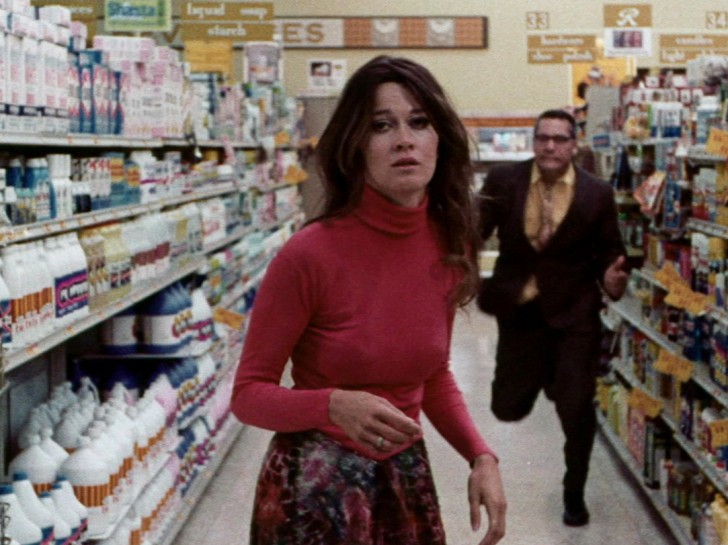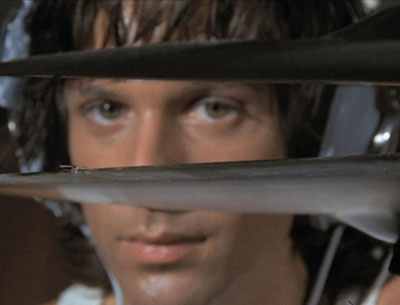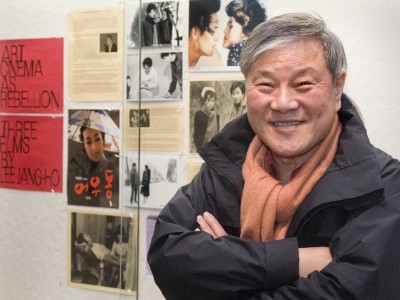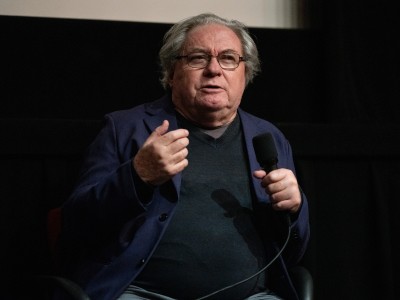
Messiah of Evil introduction by Haden Guest and Ben RIvers.
Transcript
John Quackenbush 0:00
April 10, 2015, the Harvard Film Archive screened Messiah of Evil. This is the introduction by Haden Guest, HFA director, and filmmaker Ben Rivers.
Haden Guest 0:15
[RECORDING CUTS OFF] —Gentlemen, my name is Haden Guest. I'm director of the Harvard Film Archive. I'm joined tonight by Ben Rivers, who is the curator of the series that is inaugurated by this very special screening of Messiah of Evil. I’d like to begin by asking everybody to please turn off any cell phones and electronic devices that you have and please refrain from using them. Although you may at times be tempted to call for help.
[LAUGHTER]
Haden Guest 0:47
So this is a series—we know Ben Rivers very well here at the Harvard Film Archive. He's come and he's screened his work. We've been very proud to premiere and to showcase his really extraordinary cinema. But I think lesser known is Ben Rivers the curator. Ben worked as a programmer at the Brighton Cinematheque and has a really keenly honed cinephilic sensibility and position, which is, I think, expressed very clearly, very strongly, very vibrantly in the group of films that he’s selected. Films that explore this sort of netherworld between arthouse and grindhouse. Films that are very rarely seen on the big screen, though their cult status gives them a really feverish following online. And that's true of tonight's film, Messiah of Evil, which, by a wonderful coincidence, is the same year as the film some of you may have just seen, the film we just watched earlier, The Hourglass Sanatorium. This is from 1973, and very much speaks to the cinema of the period. This is a film whose avant-garde aspirations are made very clear in a really dazzling opening sequence. It's a zombie film, but it's also an art film. Among its cast is Morgan Fisher, the great structural filmmaker who was here just a few years ago. So it's a really fascinating time capsule which brings us back to the lost world of Los Angeles in the early ‘70s, and also American independent cinema of this time. This is a film made by two recent UCLA graduates—husband and wife team—who were also working on American Graffiti at the same time. So it's a really fascinating kind of hinge piece between different cinemas—between different possible cinemas—different ideas of independent cinema. But I'll say no more. I'd like to turn the microphone over to Ben Rivers. I just want to add one comment, which is, a number of these prints come from different sources. We had to do a lot of detective work. This print is from a private collector. And it bears the patina of time, of its own individual history as a vintage exhibition print. So there's a slight color fade, and there's some scratching. But we embrace that. And we really say this is very much part of the history of this film. And so we're looking at a print that was seen by audiences in 1973. So I think that's a wonderful thing. And we're proud of that. We're going to be seeing a series of trailers before, including a trailer for the second film in the series. I won't say any more about that. But now please, with no further ado, join me in welcoming Ben Rivers.
[APPLAUSE]
Ben Rivers 4:11
Thanks. Thanks, Haden. He just said everything I was gonna say.
[LAUGHTER]
Ben Rivers 4:17
Thanks to Haden, and David, and Jeremy, and John, and everyone in the archive for sort of allowing me to do this—to kind of pull out these films which might not ordinarily show at the HFA, I don't know. Yeah, I mean, you've probably read the program notes. This series comes from a warm place in my heart, which is this kind of childhood introduction to film, to cinema via VTS. VHS. VTS? VHS. Yes. We’ve forgotten what it's called already. VHS tapes. So yeah, I was in this little village, with very little culture. But there was this video shop in the basement of the Methodist church. And this guy who—they obviously didn't know what was going on, upstairs. And he was pushing on us these movies, when we were very young and impressionable. And, I’d probably seen—my mom would maybe take me to Walt Disney or something. But, seeing The Fog or An American Werewolf in London, or I Spit on Your Grave when you're nine or ten, it has a marked effect on your impressionable mind. Sometimes not healthy, I'm sure. I don't know, I think I turned out okay. But, yeah, there was something about this stuff. I mean, it terrified me. It did. I wasn't oblivious to it. I had awful nightmares. But I kept coming back to it, and I think there's something about horror movies which has persisted, even though I don't make horror films. I make quite different kinds of films. But I think there's something about horror that's very kind of pure cinema. So it's about creating an atmosphere and effect. An immersion that is somehow, I think less—the plot is less important than the kind of visceral feeling that you might get. The plot is kind of secondary, at least I think, in the ones that I really like. Yeah, so this season is kind of hand-picked from lots of films I saw in this period. And I guess I've picked the ones which are a little bit harder to see. They're rarer, and they're probably a little more in line with the things that I'm interested in. As Haden said, Messiah of Evil is very much aligned with avant-garde cinema. There were people involved who were making experimental films, and I think this really feeds in really nicely into Messiah of Evil. It leaves a lot open to the imagination of the viewer. There's plot digressions, which don't go anywhere. In fact, the whole film doesn't really resolve itself. It's a kind of zombie film, but then, a lot of the time, the zombies don't go around eating people, which is unusual for zombies. They tend to like eating people. Yeah, I don't know. I shouldn't say much more, other than I hope you enjoy it. And there was one really nice coincidence that happened. A lot of this film kind of revolves around these people waiting for a blood moon. And last weekend, there was a blood moon. So you can read into that what you like. And it's also a great cinema scene— [RECORDING CUTS OFF]
© Harvard Film Archive
Related film series

Ben Rivers' Midnite Movies: The Witching Hour Part 3, "Because You've Never Known Fear Until it Stabs You in the Eye with a Rusty Nail"
Explore more conversations
Lee Jang-ho

Ernie Gehr

Ignacio Agüero


